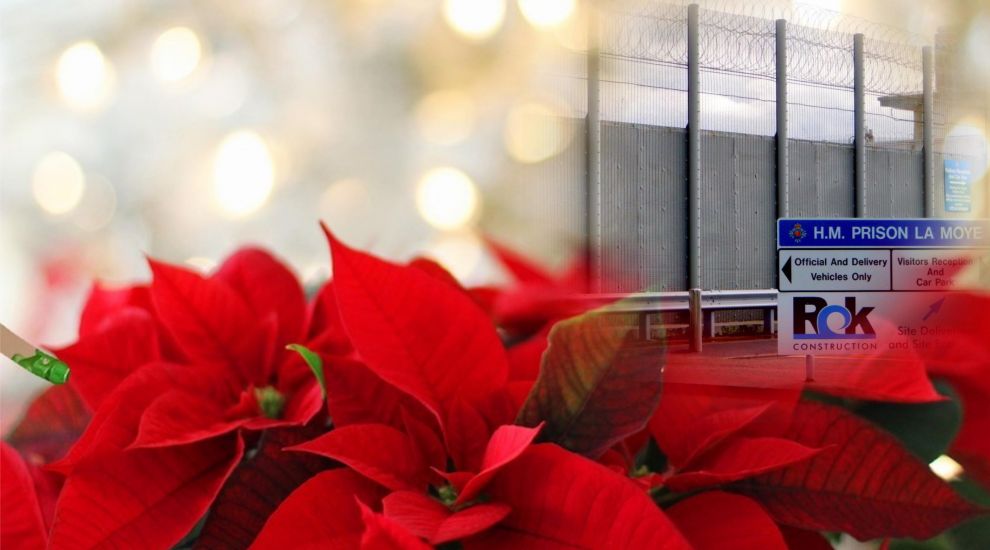

With their deep red and green foliage, poinsettias are a Christmas favourite for many, but there is something extra special about the ones being sold in Jersey: they were grown by local green-thumbed prisoners.
La Moye Prison is the only place in the Channel Islands that grows the houseplant and has been supplying the Co-op stores with the plant for the past four years.
The poinsettias start off as small ‘Plug Plants’ in July. The prisoners pot them into a specially mixed compost and store them in a greenhouse for five months to allow them to quadruple in size. When the daylight hours begin to shorten, the poinsettias start to change colour to become the distinctive plant that graces many Christmas tables.
The prison's horticultural department is the largest employer of inmates and provides them with a proper working environment. Their main aim is to grow vegetables and herbs to supply the prison kitchens, but they also grow ornamental plants, such as the poinsettias.
Poinsettias are notoriously difficult to grow and susceptible to various pests and diseases, which makes it even more satisfying for the prisoners and staff to see them fully grown and ready to put on sale.
Steve De Carteret, the prison’s Horticultural Manager, said the horticultural program is invaluable for inmates: “Most prisoners will have had no previous experience of growing vegetables. By getting them to take ownership of what they are growing and ultimately eating, they learn a great deal about the creative process of growing and also the responsibility and care required to grow something successfully."
Pictured: The horticultural department helps with the rehabilitation of inmates.
Horticultural staff are also qualified to teach and assess City and Guilds qualifications, which gives prisoners the opportunity to gain qualifications.
“Our main aim is to ensure that when a prisoner returns to society they have a skill and hopefully a qualification that can be useful to a potential employee," Mr De Carteret said. "Prisoners will, at some point, be released so a major part of our job is to ensure they are as well-equipped as they can be to provide a valuable contribution to society."
Islanders are encouraged to buy poinsettia to help the prison continue their rehabilitation work with prisoners. All proceeds from the sale are re-invested into seeds, compost, tools, and educational materials.
The prisoners' efforts have also helped supply Beresford Street Kitchen, the café with a conscience which is provides training to islanders with learning difficulties and autism. Surplus from the vegetables and herbs grown by the prisoners has been donated to the café as part of a number of La Moye's initiatives that are benefitting the community.
Prisoners also grow trees and seeds for Jersey Trees for Life, a charity which protects the local trees and provides education about them. The prison has produced more than 5,000 trees for the charity over the past ten years. The latest batch of trees has recently been collected and is being used to support the Jersey Hedgerow Campaign in St Brelade and St Peter.
This year, the prison has also created and donated food boxes to the Grand Marché stores in order to collect donations for Jersey’s Women’s Refuge and Shelter Trust. The boxes were made in the prison’s carpentry training workshop, which also produces planters, picnic tables and hardwood coffee tables.
Prisoners also up-cycle pallets, some of which are donated by the Co-op, into bird boxes, hedgehog homes and bat boxes which are then given to schools, community projects and the general public.
Additionally, a surplus of 20 poinsettias grown at the prison have recently been donated to Jersey Hospice.
In the spring, staff in the SOJPS are planning to work with Caring Cooks, a charity that promotes healthy eating in island schools, by supplying young vegetables that can be grown by schoolchildren.
Mr De Carteret said: “We are delighted to be collaborating with these charities as we explore more ways in which the work undertaken by prisoners can benefit the island. It is important that we continue to find opportunities to work with members of our community as part of the prison’s restorative justice programme."
Comments
Comments on this story express the views of the commentator only, not Bailiwick Publishing. We are unable to guarantee the accuracy of any of those comments.